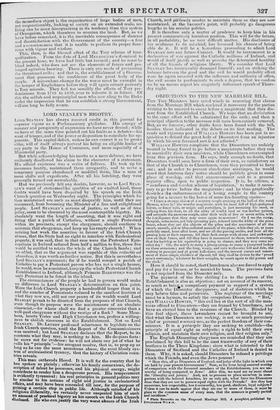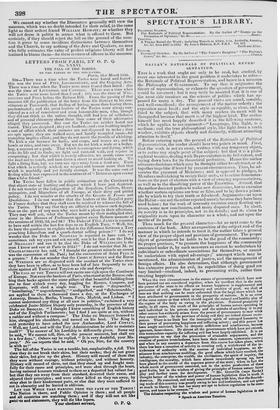OBJECTIONS TO THE NEW MARRIAGE BILL, Tins Tory Ministers have
acted wisely in removing that clause from the Marriage Bill which rendered it necessary for the parties wishing to be married to swear before a magistrate that they dis- sent from the Established Church. We hope that no declaration to the same effect will be substituted for the oath; and then a principal objection to the measure will have been entirely removed. But, as we foresaw, other faults have been found with the bill, besides those indicated in the debate on its first reading. The ready and vigorous pen of WILLIAm HOWITT has been put in re- quisition to defend the great body of Dissenters from an injustice by which his own favoured sect is not affected.*
WILLIAM HOWITT complains that the Dissenters are unfairly treated in being forced to go before a magistrate before they can be married by their own ministers, while Churchmen areexempted from this previous form. He says, truly enough no doubt, that Dissenters would soon have a form of their own, as satisfactory as that of the Church is to Churchmen, were they permitted to have one; and in order to prevent clandestine marriages, he would enact that fourteen days' notice should be publicly given in some place of worship, and that announcement sent to a general registry office, open to public inspection. It is, he affirms, a "cumbrous and wooden scheme of legislation," to make it neces- sary to go twice before the magistrate; and he thus graphically describes the embarrassment of a loving couple in the country going for a licence to the licu,e of some fox-hunting squire-
" I have a strange vision of a country couple arriving at the hall of the rural Hymen, when lo! the worthy magistrate, with his bead full of high-pedigreed horses, or foxes' tails, or snipes and partridges, is just mounting his steed, or sallying from his door, in all the glory of scarlet coat or tan-leather gaiters, and astounds the amorous couple, after their walk of five or seven miles, with the intelligence that they may come again to-morrow ! Or I see the rustic, sheepish, submissive, yet inly-groaning pair, ushered into the lobby of the great house, where they are the objects of the gibes and the merriment of all the smart, smooth, red or blue-collared menials of the place, while they sit, or more probably stand, hour after hour, and see all the passing smiles, and bear all the passing jests at their expense, till their flesh creeps with shame and awkward- ness on their bones, and till they have it announced to them, towards evening, that his lordship or his squireship is going to dinner, and they may come an- other day ! Oh, the mirth to many a plutnp group, to many a pampered lackey on these occasions ; and the long, weary, and vain walks over hill and dale, the waiting in passages and at great hall-doors, and the inward curses and resent- ment of these simple children of the soil, till they shall be driven by the proud man's contumely,' whatever be their scruples, to resort again to the parson and the clerk."
Here it should be noted, that Churchmen also are forced to apply and pay for a licence, or be married by bans. The previous form is not required from the Dissenter only. The payment of the five shilling f,!e to the parson of the Establishment is also at. objection ; not on account of its amount, so much asbeina 0 compulsory payment in support of a system ve
of which the Dissenter disapproves, and of doctrines which he may believe false and pernicious. Tim registrar of the marriage must be a layman, to satisfy the scrupulous Dissenter. " But," says Wird...ix:a llowITT, " this evil lies at the root of all the mea- sures offered to Dissenters—they are framed by Churchmen, and have an eternal bias to the revenues of the Church. Blinded by this foul object, these lawmakers cannot be brought to see, that what the Dissenters are seeking, is not so much pecuniary relief or personal convenimsce, as the perfect freedom of their con- sciences. It is a principle they are seeking to establish—the principle of equal right as subjects; a right to hold their own religion, and maintain their own religion, and that religion only."
The English Dissenting clergymen are reminded that they are proclaimed by this bill to be the least trustworthy of any of their brethren in the Three Kingdoms; since what is intrusted to the Dissenters of Scotland and the Catholics of Ireland is denied to them. Why, it is asked, should Dissenters be refused a privilege which the Friends, and even the Jews possess ?
" Hear this, all ye Dissenters of England, and judge of the light in which you
are held by your present Government ! Now, so far from being counted worthy of comparison with the favoured members of the Establishment, you are un- worthy of being compared to Jews ! After this, we need say no more shout the liberality and justice.' And, not to presume to place ourselves in com- parison with the beloved Israelites, let us only ask, what have Inc Dissenters done that they are not to possess equal rights with the Friends? Are they less numerous, less respectable, less trustworthy, less good, obedient, loyal subjects? Unless it can be made appear that they are one or more of these, it must he plain to the common sense of every man, that the measure is grossly partial and invidious."
• Plain Remarks on the Proposed Marriage Bill. A pamphlet, published by
EPYJNOLIAIA WII ,a.
We cannot say whether the Dissenters generally will view the measure, which was no doubt intended for their relief, in the same light as their ardent friend WILLIAM HOWITT ; or whether they will not deem it politic to secure what is offered to them. But .certainly, if they should reject the bill on the ground of the sanc- tion it gives to some invidious distinctions between themselves and the Church, to say nothing of the Jews and Quakers, no man who fully estimates the value of perfect religious liberty will feel inclined to blame them—for there is cause of offence in the measure.



























 Previous page
Previous page